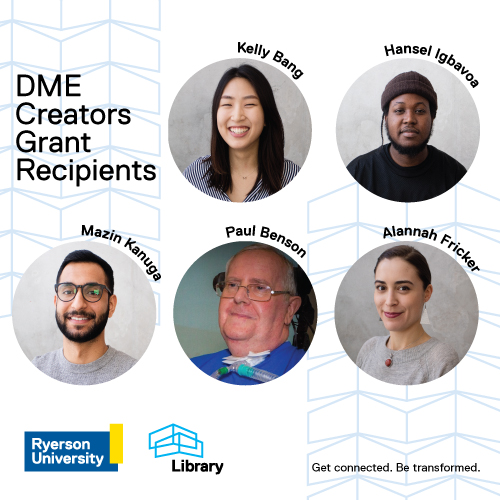 Toronto Metropolitan University Library’s 2019 DME Creators Grant recipients are charging ahead, kicking-off the development of five unique passion projects that will showcase new ways of addressing current social issues. The grant—highlighting the experiential learning and digital literacy opportunities available to students through the Library—provides funding and mentorship to students for, and throughout the development of the individual student works. Over the next four months, five undergraduates will embark on developing projects aimed at tackling local and systemic societal issues, culminating in public presentation of completed work in early September.
Toronto Metropolitan University Library’s 2019 DME Creators Grant recipients are charging ahead, kicking-off the development of five unique passion projects that will showcase new ways of addressing current social issues. The grant—highlighting the experiential learning and digital literacy opportunities available to students through the Library—provides funding and mentorship to students for, and throughout the development of the individual student works. Over the next four months, five undergraduates will embark on developing projects aimed at tackling local and systemic societal issues, culminating in public presentation of completed work in early September.
Here’s a peek at the innovative projects to come:
Kelly Bang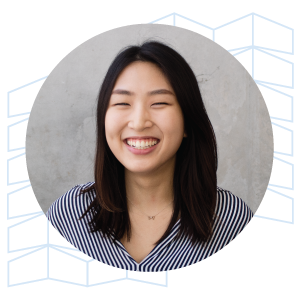 , second-year, Architectural Science, Faculty of Engineering and Architectural Science
, second-year, Architectural Science, Faculty of Engineering and Architectural Science
What will you create over the next four months?
I’ll be creating “Kaleidoscope Light Prisms” as an equitable and vibrant alternative to the planters on Gould Street. The goal is to achieve a series of prisms with built-in kaleidoscopes that reflect sunlight onto the pavement during the day, and that are interactive. At night, they will light up from within to create outdoor lamps that brighten the street.
What social issue are you addressing?
Walking through campus at night, it quickly becomes apparent there is not enough life or sense of safety on the streets. The project will address issues of safety on campus, especially at night, as well as the lack of social engagement and inclusion on campus.
What new skills are you looking forward to learning at the DME that will help you complete your project?
I hope to learn how to utilize digital fabrication tools such as 3D printing and 3D digital modelling.
What skills are you excited to gain through this mentorship opportunity?
I think that I will be able to gain technical skills as well as learn about how projects are brought to fruition.
Paul Benson, first-year, Disability Studies, School of Disability Studies,
Faculty of Community Services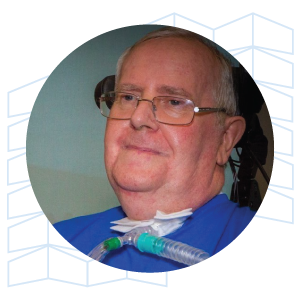
What will you create over the next four months?
I will be working on a documentary (the working title is Agents of Change: The Disability Edge) that showcases persons with disabilities who are agents of social change. The documentary will highlight disability issues in a positive and creative way.
What social issue are you addressing?
The project will address the undervaluing of the contributions of Persons with disabilities (PwDs) within society. PwDs are at times viewed as limited in what they can, and do contribute to society. They are sometimes even seen as a burden. There is overwhelming evidence that PwDs are, and can be exceptional contributors – often in ways that are based on the result of their experiences with disabling conditions.
What new skills are you looking forward to learning to complete your project?
Professional quality video capture, video editing, titling, and capturing.
What do you think you’ll gain through mentorship opportunity?
An understanding of all components of a documentary project from video capture to final product.
Alannah Fricker, third-year, Social Work, Faculty of Community Services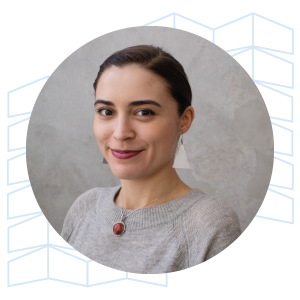
What project will you create over the next four months?
I am going to be working on a harm reduction website that supports student safety and includes a public health approach to substance use at Ryerson.
What social issue will your project address?
The website will provide students with evidence-based harm reduction information, supports, skills, and resources to promote safety; explore viable alternatives to prohibitionist drug policies that disproportionately affect Black and Indigenous people and other marginalized communities; and will educate about intersectional oppression, challenge drug use stigma, and address problematic myths, stereotypes, and language.
What new skills are you looking forward to learning at the DME that will help you complete your project?
I’d like to learn project management skills, user experience (UX) and web layout design, and how to develop an online store set-up.
What skills are you excited to gain through this mentorship opportunity?
I think mentorship will help with design and implementation, managing my research team, and having structured goals and timelines.
Hansel Igbavboa, third-year, Entrepreneurship & Strategy, Ted Rogers School of Management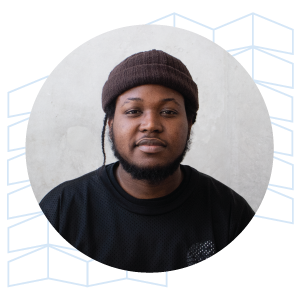
What will you create over the next four months?
I’ll be working on a mixed media interactive short film celebrating the beauty of Black people’s hair. It will incorporate photography, videography, 3D modelling, music and spoken word with elements of traditional documentary film techniques, producing a creative audio-visual sequence.
What social issue are you addressing?
Discrimination against Black people and their hair. Black people are not only discriminated against for their skin colour, but we are also discriminated against for the texture of our hair and the nonconformity of our hairstyles. Although the film will touch on the struggles Black people endure, it will focus on celebrating the beauty of our hair, especially centering Black women.
What new skills are you looking forward to learning at the DME that will help you complete your project?
3D modelling, virtual reality storytelling, audio editing and lighting
What skills are you excited to gain through this mentorship opportunity?
I hope to gain some of the skills listed above and get new and interesting insight into the media industry. I’m hoping that will allow me to continue telling stories and sharing perspectives that are buried in stereotypes.
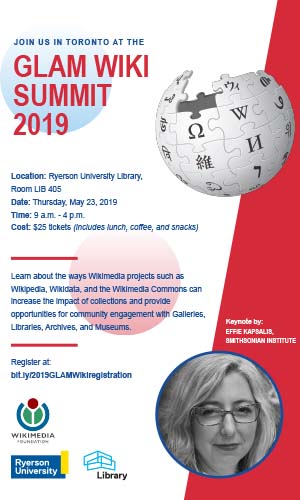
 Toronto Metropolitan University Library’s 2019 DME Creators Grant recipients are charging ahead, kicking-off the development of five unique passion projects that will showcase new ways of addressing current social issues. The grant—highlighting the experiential learning and digital literacy opportunities available to students through the Library—provides funding and mentorship to students for, and throughout the development of the individual student works. Over the next four months, five undergraduates will embark on developing projects aimed at tackling local and systemic societal issues, culminating in public presentation of completed work in early September.
Toronto Metropolitan University Library’s 2019 DME Creators Grant recipients are charging ahead, kicking-off the development of five unique passion projects that will showcase new ways of addressing current social issues. The grant—highlighting the experiential learning and digital literacy opportunities available to students through the Library—provides funding and mentorship to students for, and throughout the development of the individual student works. Over the next four months, five undergraduates will embark on developing projects aimed at tackling local and systemic societal issues, culminating in public presentation of completed work in early September. , second-year, Architectural Science, Faculty of Engineering and Architectural Science
, second-year, Architectural Science, Faculty of Engineering and Architectural Science


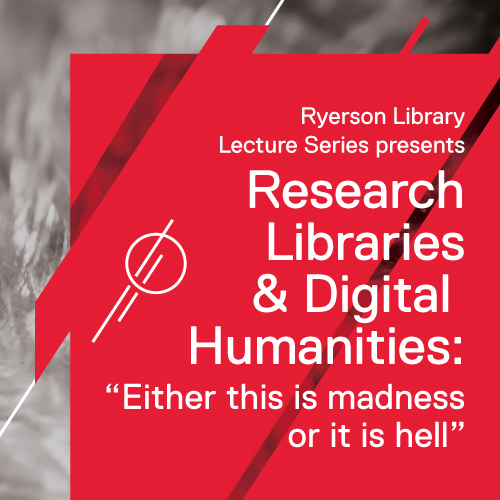
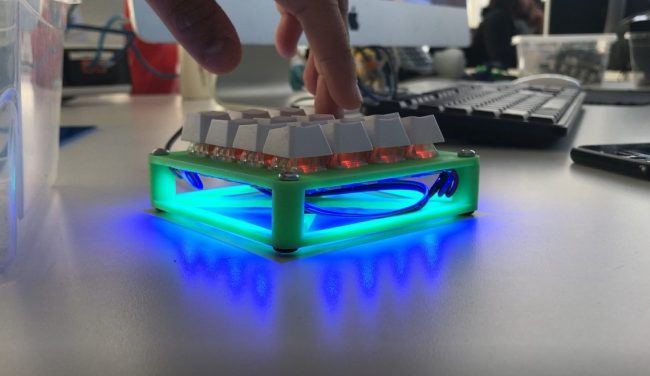 Fourth year student Charles Garcia lights up his own mini keypads at the Library’s DME
Fourth year student Charles Garcia lights up his own mini keypads at the Library’s DME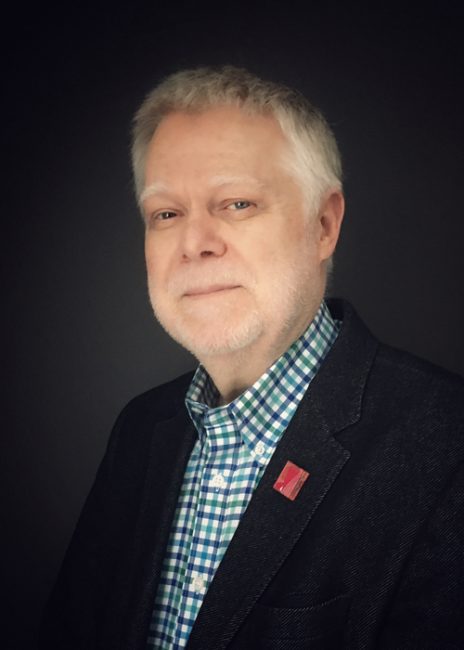
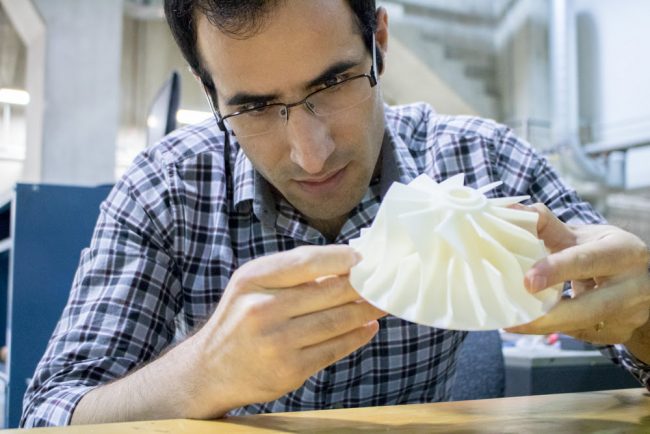
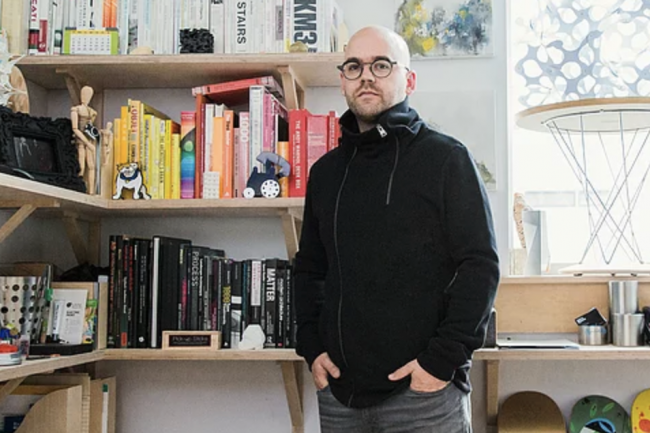
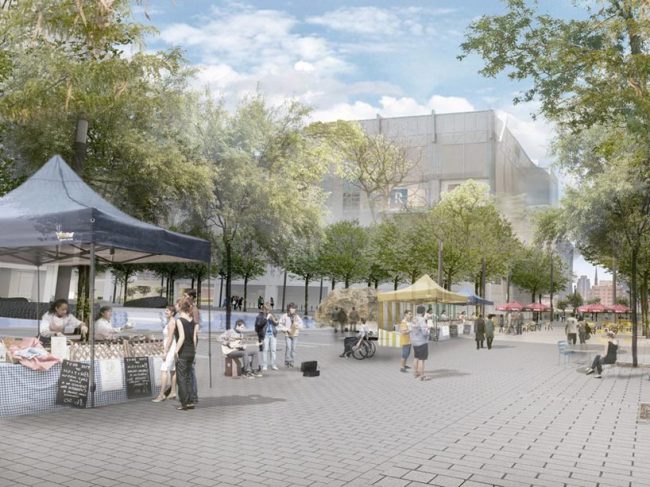 If you notice some construction on Gould and Victoria Streets in the coming weeks, you may wonder what’s going on and why.
If you notice some construction on Gould and Victoria Streets in the coming weeks, you may wonder what’s going on and why.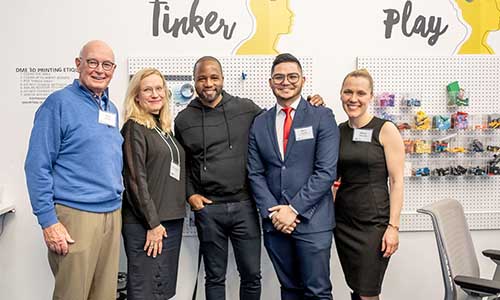 On Thursday, March 14, 2019 Toronto Metropolitan University Advancement hosted the “Rule of the Robot” Blue & Gold Society event at the Library Collaboratory.
On Thursday, March 14, 2019 Toronto Metropolitan University Advancement hosted the “Rule of the Robot” Blue & Gold Society event at the Library Collaboratory.